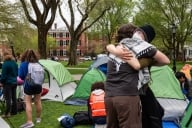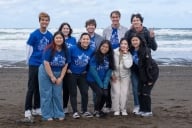You have /5 articles left.
Sign up for a free account or log in.
William Ayers’s radical past has made life difficult from him over the past few years. First it hurt his speaking schedule, then it was cited as a reason to deny him emeritus status, and now it is keeping him from speaking at an academic conference in Canada.
Ayers, who was an education professor at the University of Illinois at Chicago until he retired last year, was one of the founders of a Vietnam-era protest group called the Weathermen, which became the Weather Underground, a group involved in several major protests in the early 1970s and blamed for bombing several government buildings.
Since then Ayers has built a successful career as an education professor and school reformer. But his past was publicized during the 2008 presidential campaign when Republicans tried to link him to then-candidate Barack Obama. While the connection between the two didn’t extend much beyond being neighbors and moving in the same academic circles, it was enough to make Ayers a household name.
After that, several universities canceled his scheduled talks and faced pressure to ensure that public money was not used to fund his appearances. He also regularly faces protesters at his talks.
When he tried to speak at an education conference in Canada in 2009, he found the country off-limits. A second trip ended the same way. He is now trying to get the situation sorted out before June, when he is scheduled to attend a conference in Toronto called “Worldviews: Media Coverage of Higher Education in the 21st Century.” The conference is being held at the University of Toronto, with numerous academic and media organizations – including Inside Higher Ed – as co-sponsors.
While he has an arrest record from his protest activities in the '70s that includes several misdemeanor charges, those charges never kept him from traveling to Canada before, which he said he did about a dozen times in the past decade for academic and recreational purposes. But in 2009, he said, Canadian officials at the airport cited a “major felony” and put him on a plane back to Chicago. “They said, ‘Sir, you seem like a nice guy, but you’re not getting into Canada today,’ ” Ayers told Inside Higher Ed.
Ayers was never convicted of a felony, and he said he has not gotten an answer from Canadian authorities on what the officials were referring to.
“Admissibility to Canada is considered on a case-by-case basis and is based on information that is available to our officers at that time of entry,” said a spokeswoman for the Canada Border Services Agency in an e-mail. “Several factors are used in determining inadmissibility, including involvement in criminal activity, health reasons, misrepresentation, or non-compliance" with the law.
The refusal to allow Ayers entry into Canada, especially for academic purposes, has angered some faculty groups, who see the ban as a violation of academic freedom.
“Martha Stewart – who did time in a federal prison – received special dispensation from the Canadian Government to attend a ‘pumpkin regatta’ in Nova Scotia a few years ago and last year was allowed to speak at the Canada Blooms show in Toronto,” said Mark Langer, president of the Ontario Confederation of University Faculty Associations, in a written statement. “I wonder about a government that will let an American felon paddle around in a hollowed-out pumpkin, but refuses to allow a respected academic to participate in our democratic discourse.”
Ayers said the fact that he’s being prevented from attending an academic conference -- not from just visiting for pleasure -- frustrates him more. “I’m not a threat to the security of Canada,” he said. “Both the times I was turned away, I sat and read and talked to myself. I wasn’t denied my right to talk to me. It’s the students that were denied their right to engage with me. They’re denying their citizens the right to engage, and let’s assume argue with, this foolish American. It undermines the very essence of a democratic society.”
Ayers said he has lawyers working on both sides of the border to try to figure out why he hasn’t been allowed in. He said he still plans on speaking at the conference in June, though he might have to do it by teleconference.








